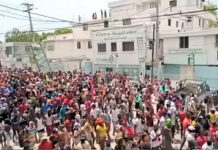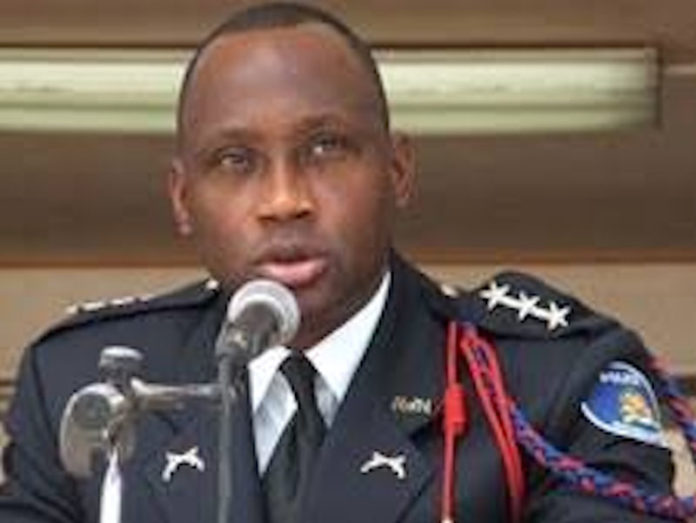
First, President Michel Martelly got rid of Prime Minister Garry Conille in February. Now, he is trying to fire the Director General of the Haitian National Police (HNP) Mario Andrésol. But the police chief is refusing to step down.
The showdown for control of Haiti’s only official armed force, and the crux of state power, is part of a larger, complex class struggle between three sectors: Washington, Martelly’s neo-Duvalierists, and the Haitian masses.
Andrésol is a key pawn of Washington on Haiti’s political chessboard, as was Conille (see “Class Analysis of a Crisis: What Lies Behind PM Conille’s Resignation?” in Haïti Liberté, Vol. 5, No. 33, 2/29/2012). Since becoming Haiti’s police chief in 2005, he has been viewed by Washington as “trustworthy,” according to numerous secret U.S. State Department cables obtained by the media organization WikiLeaks and provided to Haiti Liberté.
Since becoming Haiti’s police chief in 2005, Andrésol has been viewed by Washington as “trustworthy.”
Martelly’s sector, which came to power through an illegal March 2011 election, is not considered trustworthy. The new president borrows inspiration, officials, and tactics from the dictatorships of Presidents “for life” François and Jean-Claude Duvalier (1957-1986). Martelly’s principal gambit today is to reconstitute a repressive force similar to the Duvalier’s Volunteers for National Security (VSN), better known as the Tontons Macoutes. Toward this end, he has tolerated (and some reports say organized) the re-arming of former and would-be soldiers and paramilitaries now occupying several former Haitian Army bases around Haiti. Remobilization of the Haitian Army, disbanded by former President Jean-Bertrand Aristide in 1995, was one of Martelly’s campaign promises.
On street corners and radio shows, Haitians now express their apprehension about Martelly’s embryonic but still unofficial “Pink Army” (lame wòz), a reference to the color of Martelly’s campaign posters.
Washington, along with its junior partners France and Canada, also opposes reestablishment of the Haitian Army (Forces Armées d’Haïti or FAdH), because the force would not be under its control as are the HNP and the 9,000 foreign military occupation troops known as the United Nations Mission to Stabilize Haiti or MINUSTAH.
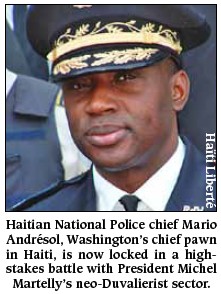
Following Conille’s forced resignation on Feb. 24, Andrésol, 51, is the last high-ranking Haitian official who is loyal to Washington’s agenda of making Haiti a thoroughly obedient neocolony. He began his career as a Haitian Army captain with posts in the Traffic corps and at the Port-au-Prince airport. After the FAdH’s dissolution, he joined the Interim Police Force, becoming close to its chief Dany Toussaint, and later he became an HNP police chief in Pétionville.
Under the first administration of former President René Préval (1996-2001), Andrésol became a protégé of Robert “Bob” Manuel, the Secretary of State for Public Security, and was soon promoted to the chief of the Central Direction of the Judiciary Police (DCPJ), the third most powerful police post. There, he worked closely with U.S. officials, particularly those of the U.S. Embassy’s Narcotics Affairs Section (NAS).
Aristide took office for a second time in February 2001. In August 2001, Aristide’s government arrested Andrésol, alleging that he was involved in a deadly Jul. 28, 2001 attack on Haiti’s Police Academy and two police stations, in which at least eight cadets and policemen were killed. It was the first incursion by the so-called “rebel” force based in the Dominican Republic and headed by Guy Philippe, another former soldier and police chief whom Andrésol worked with closely under Bob Manuel.
But the U.S. government intervened after Andrésol was detained. The Los Angeles Times wrote a Aug. 24, 2001 piece that decried Andrésol’s arrest, calling him “a super-cop” and “a rare Haitian hybrid of Frank Serpico and Eliot Ness.” Soon, Andrésol was freed, going into exile in Miami.
He would soon be recalled to service. After Philippe and his “rebels” succeeded, with the help of U.S. Special Forces, in overthrowing Aristide on Feb. 29, 2004, Washington installed the government of de facto Prime Minister Gérard Latortue. In mid-2005, Latortue brought Andrésol back to Haiti as the HNP’s Director General (DG) to whip into shape the force, which had been ineffective and faltering in the face of stiff popular resistance to the 2004 coup d’état. WikiLeaked U.S. Embassy cables show that the appointment delighted Washington.
Andrésol “has proved himself committed to radical overhaul and reform of the HNP, and we have no reason to believe he will not continue to fully support critical aspects of international oversight, especially vetting and certification of HNP officers,” gushed a Mar. 8, 2006 “Confidential” dispatch from Embassy Chargé d’Affaires Douglas Griffiths.
Washington was not just the HNP’s overseer, but its paymaster. “Our role in supporting the HNP… remains central,” explained Chargé d’Affaires Thomas Tighe in a Nov. 3, 2006 cable. “[O]ur material support for the HNP, which ranges from arms and ammunition to the uniforms on their backs and the food their cadets eat at the academy, is the critical factor enabling the HNP to assume greater responsibility for basic security and to even contemplate utilizing MINUSTAH resources in implementing more ambitious reform.”
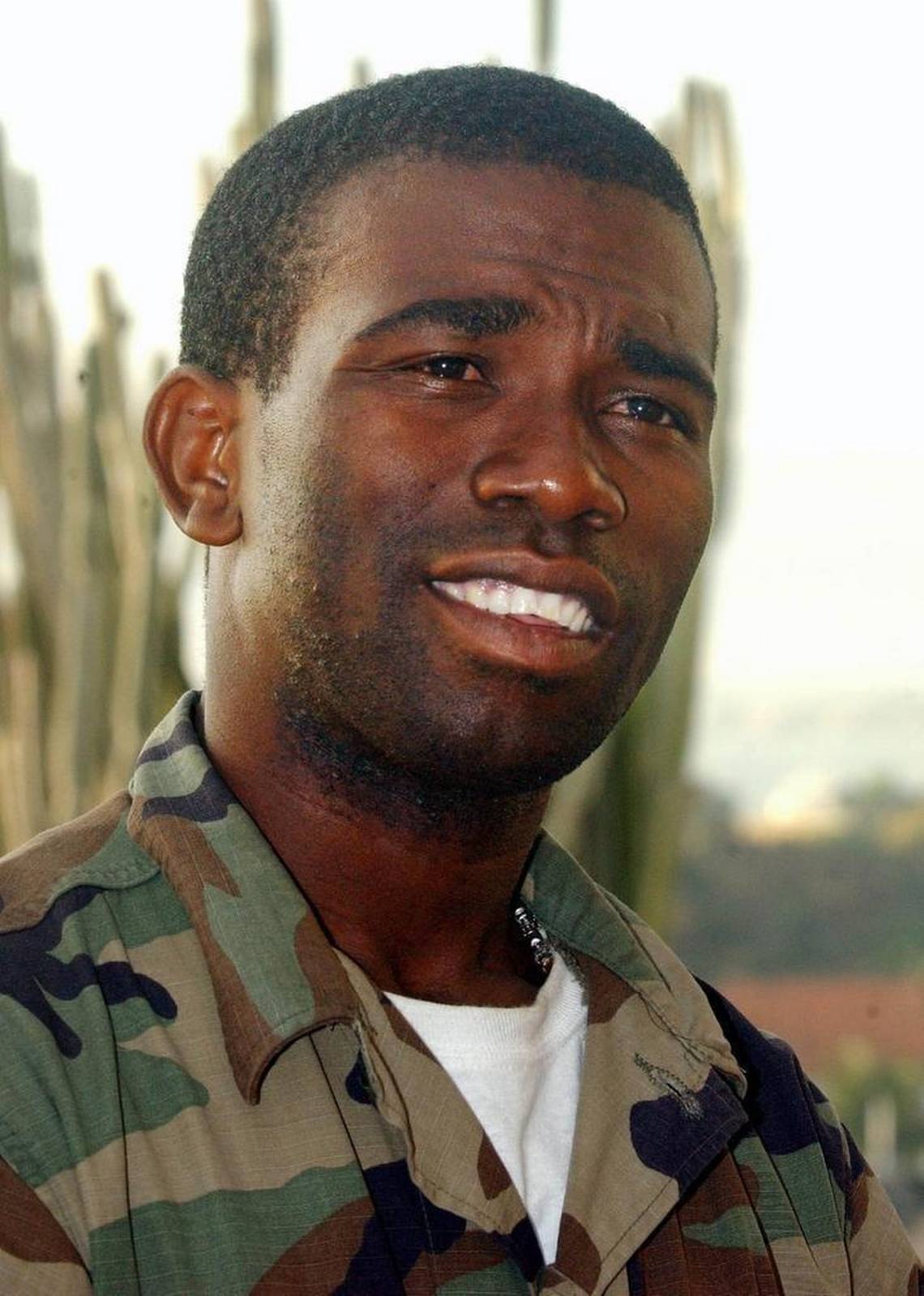
Above all, Tighe concluded, “we are heartened by the commitment of DG Andrésol… to reform the HNP, attack corruption, and re-establish law and order throughout Haiti.”
In a Nov. 3, 2006 meeting with President Préval, his Prime Minister, his Justice Minister, Andrésol, and U.S. Embassy officials, Anne W. Patterson, the Assistant Secretary of the U.S. Bureau of International Narcotics and Law Enforcement Affairs (INL) “highlighted the importance of the USG [U.S. government] assistance to the police and praised the leadership of DG Andrésol,” reported U.S. Ambassador to Haiti Janet Sanderson in a Nov. 13, 2006 secret cable.
Andrésol earned this praise by working closely with the U.S. and the MINUSTAH in organizing the crackdown on popular resistance cells to the coup and occupation (called “gangs” by the Embassy) in Cité Soleil, particularly the deadly joint MINUSTAH/HNP assault of Dec. 22, 2006. In her Dec. 21, 2006 cable about the operation, Sanderson concluded: “Decisive action against the gangs will also hopefully, three years after Aristide’s departure, allow the international community and the GoH [Haitian government] to make good on promises to deliver assistance to the most needy of Haiti’s poor.”
Furthermore, “Andrésol enthusiastically welcomed” among other things “the possibility of more U.S. police officers coming to MINUSTAH to assist the HNP” and said “he needed more assistance from the U.S. for the special HNP units such as the SWAT team,” Sanderson reported in a Jan. 25, 2007 cable.
Two of Andrésol’s advisors “are funded by [the Embassy’s] NAS,” noted Tighe in a Jul. 15, 2009 dispatch approving of Andrésol reappointment as police chief. “Post views the renewal of Andrésol’s mandate as the best possible result,” he concluded. “As DG he has worked well with the USG on reform of the HNP and no other candidate was viewed by Post as viable or trustworthy.”
“Andrésol has not only promoted honesty and integrity within the HNP, but has undertaken significant initiatives,” Sanderson wrote in another typical Jun. 16, 2006 cable which reveals Washington’s control of the HNP. “We look forward to maintaining our own close bi-lateral cooperation through him and expanding overall multi-lateral coordination as we intensify our efforts to rebuild the HNP.”
But even President Préval and his Prime Minister Jacques Edouard Alexis, who kept a friendly front with the U.S. Embassy, were worried about how the U.S. Embassy was working “through” Andrésol. “[P]ost also learned that the PM [Alexis] privately warned Andrésol… of ‘being too close to the Americans,’” Tighe reported in a Dec. 26, 2006 cable.
As Martelly has veered from the control of the U.S. officials who facilitated his rise to power last year, his relations with Andrésol have deteriorated.
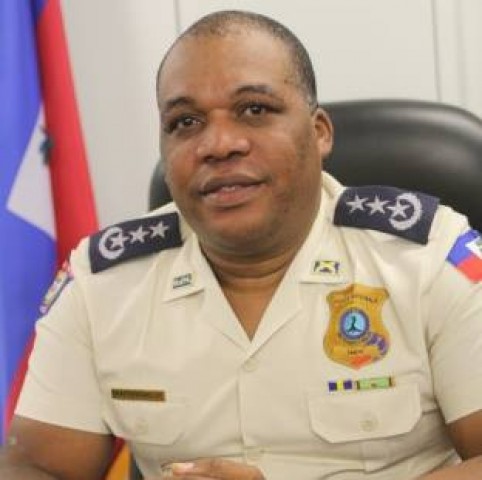
Last year, Martelly asked Andrésol to appoint one of his partisans, Godson Orélus, as the HNP’s Inspector General, the force’s number two post, a former high-ranking police official told Haïti Liberté. This would have made Orélus “the next in line to act as the HNP’s chief,” according to the source. Instead, Andrésol appointed Orélus as head of the DCPJ, the number three post.
In February, according to another police source, Martelly asked Andrésol to transfer the heavy weapons of units like the Company for Intervention and Maintenance of Order (CIMO) and SWAT team to the Palace Guard, which is under the command of former “rebel” leaders Godwork Noel and Jacky Nau. Andrésol refused.
“Relations between the HNP’s Director General and President Martelly are worsening from day to day,” reported Robenson Geffrard in the daily Le Nouvelliste. “Mario Andrésol practically does not respond to phone calls from the National Palace nor to those from the Ministry of Justice and Security, according to a very influential member of the government. ‘He doesn’t respond to anybody.’”
In a slap to Andrésol, President Martelly has made several visits to various police units like the CIMO and SWAT team, without informing or including the police chief, as is customary.
Last week, acting Justice Minister Michel Brunache reportedly called on Andrésol to make an “honorable exit” from his post, but Andrésol has vowed to remain in his post until the end of his mandate on Aug. 18.
According to Geffrard’s high-placed anonymous government source, Andrésol “thinks that he has the support of the international community.”
Now Martelly is trying to turn the tables on Andrésol. Under pressure from Washington, the president is pretending that he wants the Pink Army’s training camps closed and is asking Andrésol to do it.
“Paradoxically, the government knows perfectly well that the police would not be able to dislodge the ‘former soldiers,’” Geffrard reports. “There is a disproportionate rapport of force. ‘The HNP cannot do it,’ acknowledged this influential government official.”
The showdown for control of Haiti’s only official armed force, and the crux of state power, is part of a larger, complex class struggle.
But another formerly high-placed police source told Haïti Liberté that Andrésol wouldn’t go after the proto-FAdH’s camps even if he could. “Andrésol sees that Martelly is under pressure from the so-called international community to shut down the camps and that he is giving the problem to Andrésol, trying to make him look ineffective,” the source said. “But Andrésol is playing smart too, not taking the bait. In effect he’s telling Martelly: you made this problem, you fix it.”
On Mar. 29, the 25th anniversary of the ratification of Haiti’s 1987 Constitution, Guy Philippe will leave his redoubt in the southern town of Pestel to lead a march of former soldiers in the northern city of Cap Haïtien demanding reestablishment of the FAdH. This is the neo-Duvalierist sector flexing its muscle in Andrésol’s face.
What will be Andrésol’s reaction to his former comrades-in-arms who are now arrayed against him? Just three years ago, Andrésol was hunting for Guy Philippe, according to the U.S. Embassy. “Two separate deployments of HNP SWAT officers took place to Pestel, stronghold of wanted drug trafficker and disqualified Senate candidate Guy Philippe,” wrote Ambassador Sanderson in a May 22, 2009 secret cable. “The initial deployment of 15 HNP on April 7 was to ensure that the polling place, closed by Philippe following his disqualification, would open on April 19 for the Senate election as scheduled. In reality, it was also intended to establish a stronger HNP presence in Pestel to facilitate active efforts to arrest Philippe. 18 additional SWAT officers were deployed on April 18. HNP DG Andrésol has vowed to keep them there until Philippe is arrested.” Will Andrésol (or the DEA or MINUSTAH) dare to try to arrest Philippe on Mar. 29?
Interestingly, some of the Lavalas base groups which might have once been the targets of HNP crackdowns a few years ago are now defending Andrésol since they see him as a temporary ally in the fight to stop the establishment of Pink Army. They fear Martelly’s new force could be as savage and deadly as the Tontons Macoutes. Lavalas base leaders like Franco Camille and Ronald Fareau have gone on the radio to champion Andrésol as an honest and well-meaning cop.
The stakes in this struggle are very high, and the possibility of bloodshed cannot be ruled out. The HNP chief is as aware of this as anyone. Andrésol was “frank about his status in Haiti after his term ends,” wrote Sanderson in a Feb. 22, 2007 secret cable, “saying that he would have to live in exile to stay alive.”




